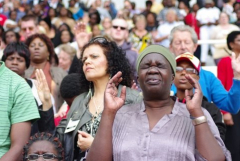Pharisees don't get a very good press in the New Testament. They are usually portrayed as Jesus' enemies, anxious to catch him out with a leading question or harsh attempt to put him down.
That isn't a complete picture of them, by any means. They were a social and religious movement in the years before the fall of Jerusalem in AD 70. They studied the Scriptures intently and were deeply serious about their faith. Gamaliel, who spoke up in favour of the apostles in Acts 5, and Josephus the historian, were both Pharisees. After the fall of Jerusalem they were the ones who helped ensure the survival of the Jewish faith.
In the New Testament, however, they are the ones who are too righteous for their own good. They can't bear to see the law of God infringed, even when it's for other people's good.
But it's not only the New Testament that portrays them like that. In the Jewish Talmud (Ṣota 22b) they are divided into seven different types. These are:
1. The "shoulder" Pharisees, who wear their good actions on their shoulders for everyone to see.
2. The "wait-a-little" Pharisees who always find excuses for putting off a good deed.
3. The "bruised" Pharisees, who run into walls because they are so busy avoiding looking at women.
4. The "pestle" or hunched-over Pharisees, who walk bent over in pretended humility (think Dickens' Uriah Heep).
5. The "ever-reckoning" Pharisees, always weighing their good deeds against the bad.
6. The "fearful" Pharisees, who are are frightened of doing the wrong thing.
But Christians who are inclined to look down on Pharisees because of how they're portrayed in the New Testament might like to pause for a moment. Some of these characteristics are uncomfortably close to home. We all know people – probably in our own churches! – who are like one or another of these. They are in every congregation, every denomination and in every religion; they are examples of what happens when faith goes bad, or when it's crippled or choked through bad teaching or bad experiences. We might even identify with some of these Pharisees ourselves.
Finally, though, the Talmud speaks of:
7. The "God-loving" Pharisees, who really love God from their heart and take delight in his law.
We are all tempted to spiritual error. But God calls us to trust him alone for our salvation and walk with him in confidence and hope.
Follow Mark Woods on Twitter: @RevMarkWoods

















